-
Masterclass on Tackling Impostor Syndrome
5 Lessons-
PreviewImpostor Syndrome due to Information Overwhelm
-
StartWhy negotiating your salary is difficult if you have Impostor Syndrome
-
Start2 hour Masterclass - Tackling Impostor Syndrome
-
StartHow top performers develop Impostor Syndrome
-
StartDaily practices you can adopt to prevent Information Overwhelm
-
Tackling Impostor Syndrome
Data-backed strategies to remove self-doubt, and deliver on your KRAs with confidence

What is Impostor Syndrome?
It is to constantly doubt your abilities, and not internalise or recognise your past achievements or successes.
Common thoughts of someone experiencing Impostor Syndrome:
👉🏼 What do I truly bring to the table?
👉🏼 What are my signature strengths?
👉🏼 How are they any different from any one else?
👉🏼 What if I was just lucky and got this job/promotion?
👉🏼 What if I'm not able to do justice to this role?
And a common theme of...
👉🏼 Needing to prove yourself over and over again!
Do you see this happening with you?
What does Impostor Syndrome look like in our work-lives?

Client 1

Client 2
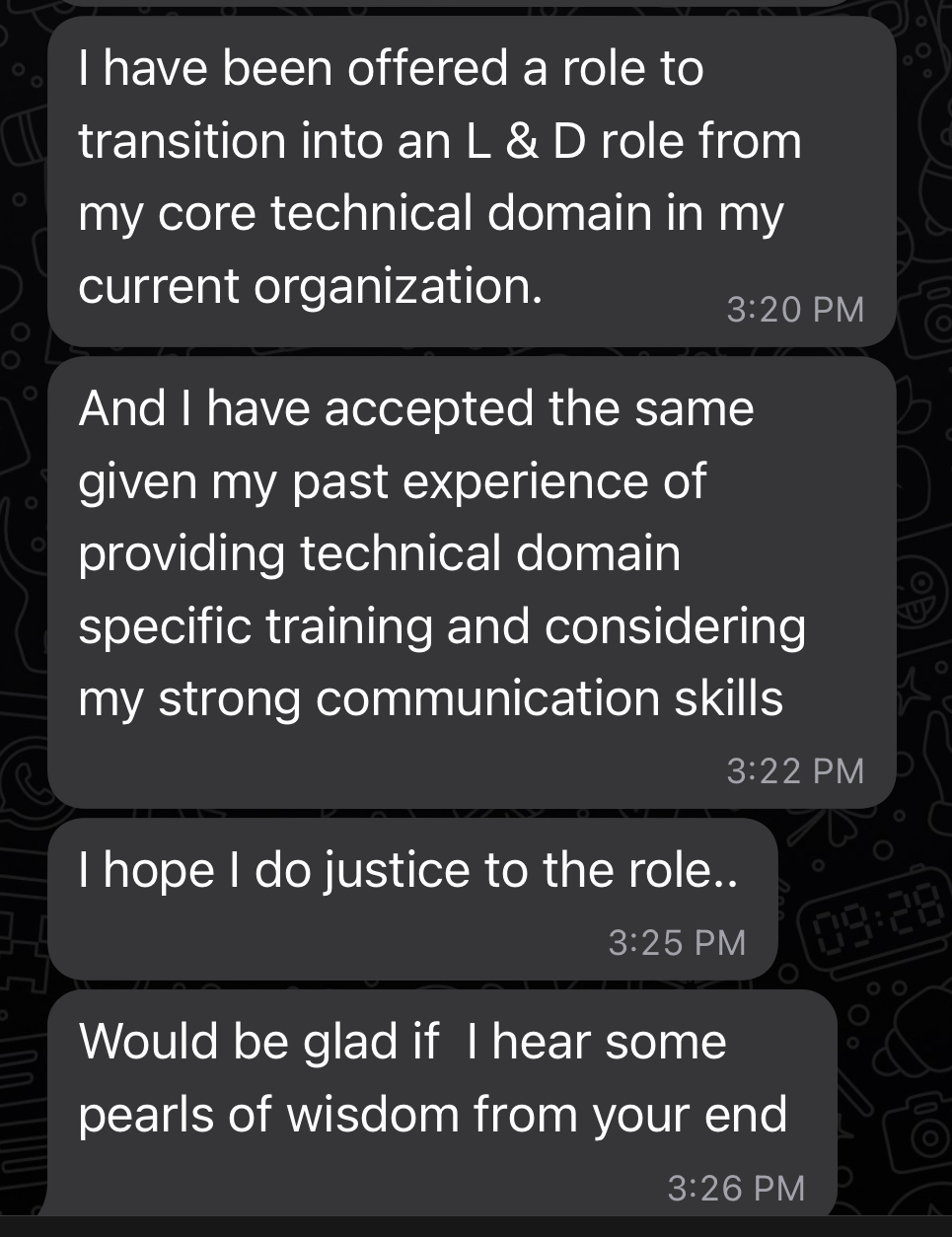
Client 3

Client 4
If you're constantly stricken with self-doubt and aren't able to internalise your past successes, it's time to take action!
When any person is unclear about certain aspects in his life, there are oftentimes moments when he will dwell into self-doubt and indecisiveness. This non-clarity combined with self-doubt, generally creates a mind freeze or an inertia. Karishma has helped me find clarity in my thoughts, this has helped me cope much better at my workplace and my other interactions too. My confidence in my abilities has once again picked up.Xavier Pires - Account Manager India, Talent At Work, Mumbai
When any person is unclear about certain aspects in his life, there are oftentimes moments when he will dwell into self-doubt and indecisiveness. This non-clarity combined with self-doubt, generally creates a mind freeze or an inertia. Karishma has helped me find clarity in my thoughts, this has helped me cope much better at my workplace and my other interactions too. My confidence in my abilities has once again picked up.
Xavier Pires - Account Manager India, Talent At Work, MumbaiWhat you will learn in this course
📌 How to assess your competence objectively which includes...
👉🏼 Understanding your signature strengths, and how *you* are adding value, and
👉🏼 Understanding your areas of improvement so that you can proactively work on them
📌 How to handle your Impostor Syndrome so that you don't settle for a salary lower than what you deserve
📌 How to set yourself up for success in the first year of taking a new job or getting promoted... and not let self-doubt and Impostor Syndrome take over
And,
📌 Understand common causes of Impostor Syndrome so you can prevent yourself from falling into the trap of Impostor Syndrome, going forward
Actionable content so that you can deliver on your KRAs with complete confidence!
The course that's being called a masterpiece by many...

Client 1
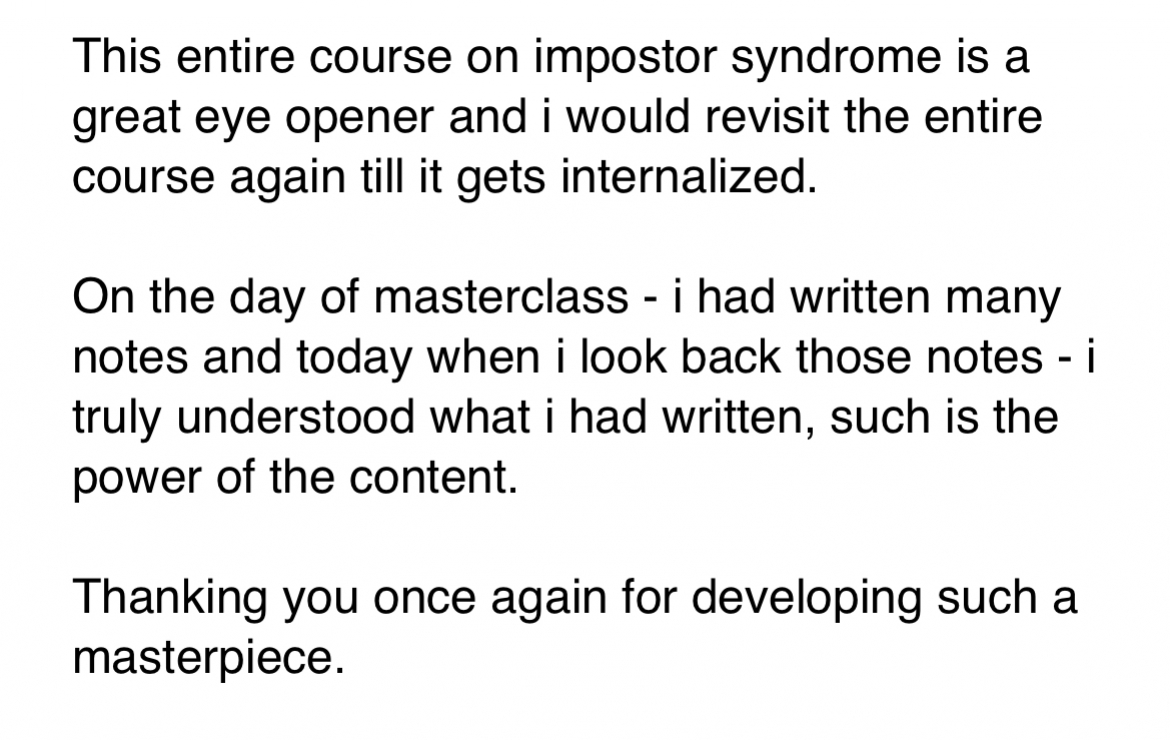
Client 2

Client 3

Client 4
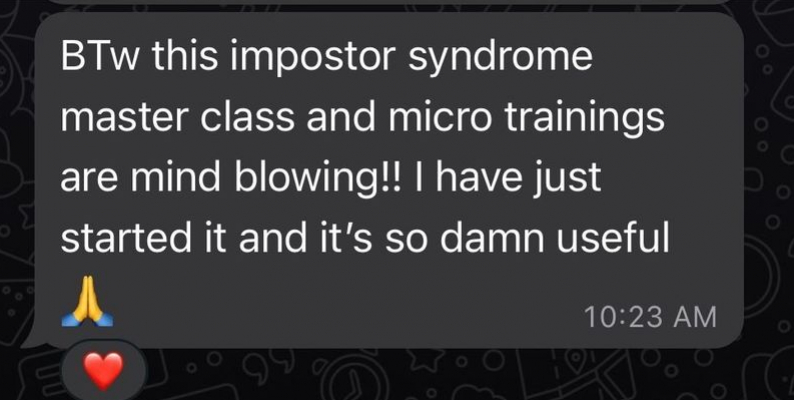
Client 5

Client 6
This pre-recorded course has 5 sections ⤵️
💥 A 20 min video training explaining a common cause of Impostor Syndrome, and 3 ways to tackle it
💥 Audio training on why people with Impostor Syndrome find it difficult to negotiate their salary
💥 Audio training on how top performers develop Impostor Syndrome
💥 Audio training on daily practices that you can adopt to prevent yourself from getting Impostor Syndrome, going forward
💥 2 hour pre-recorded masterclass on Tackling Impostor Syndrome with 3 parts on...
Part One: How to handle Impostor Syndrome when you take a new job or get promoted
Most people are looking to make a good impression in the first couple of months in a new role... after all, you want to prove to your new boss that it was a good decision to hire you!
But this often back-fires... because you realise that there is a lot that you don't know about the role, and even though you're working long hours trying to learn it all, you can't quite beat that nagging feeling that perhaps you won't do justice to it.
In this part, I cover a 6 month action plan of how to nip this in the bud such that...
👉🏼 You bolster your confidence in your skill-set
👉🏼 You garner the support of your co-workers who in most cases may not be supportive upfront
👉🏼 You gain the good-will of your boss
Part Two: How to handle Impostor Syndrome if it has become a pattern with constant self-doubt
A majority of people have a harsh inner-critic... which means no one says as many critical things to us as we say to ourselves!
Over the years, this pattern leads to us...
👉🏼 Being unsure of ourselves
👉🏼 Wondering what we bring to the table
👉🏼 Needing to prove ourselves over and over again
It is this very pattern that makes us hesitant in negotiating a higher salary... after all, if we don't think we're good enough then how can we ask for a higher salary. One can be a top performer and outwardly confident and yet be plagued with such thoughts, and it can be quite debilitating.
In this part, I share data-backed strategies on how you can handle this pattern, and even put a stop to it, so that it doesn't hamper your progress.
Part Three: Root-cause of Impostor Syndrome, and how to address it
To ensure lasting impact of the strategies, we need to understand the underlying cause of Impostor Syndrome. In this part, I go deep into...
👉🏼 Why one develops Impostor Syndrome, and
👉🏼 How to become mindful of the patterns that cause it to amplify
Actionable content so that you can deliver on your KRAs with complete confidence!
Curriculum
And what's more... you can watch the 20 min training absolutely free by clicking 'PREVIEW' below.
In this training, I talk of one of the main causes of Impostor Syndrome, and 3 actionable suggestions on how to prevent it.
A few more messages from people who have gone through this course...

Client 1
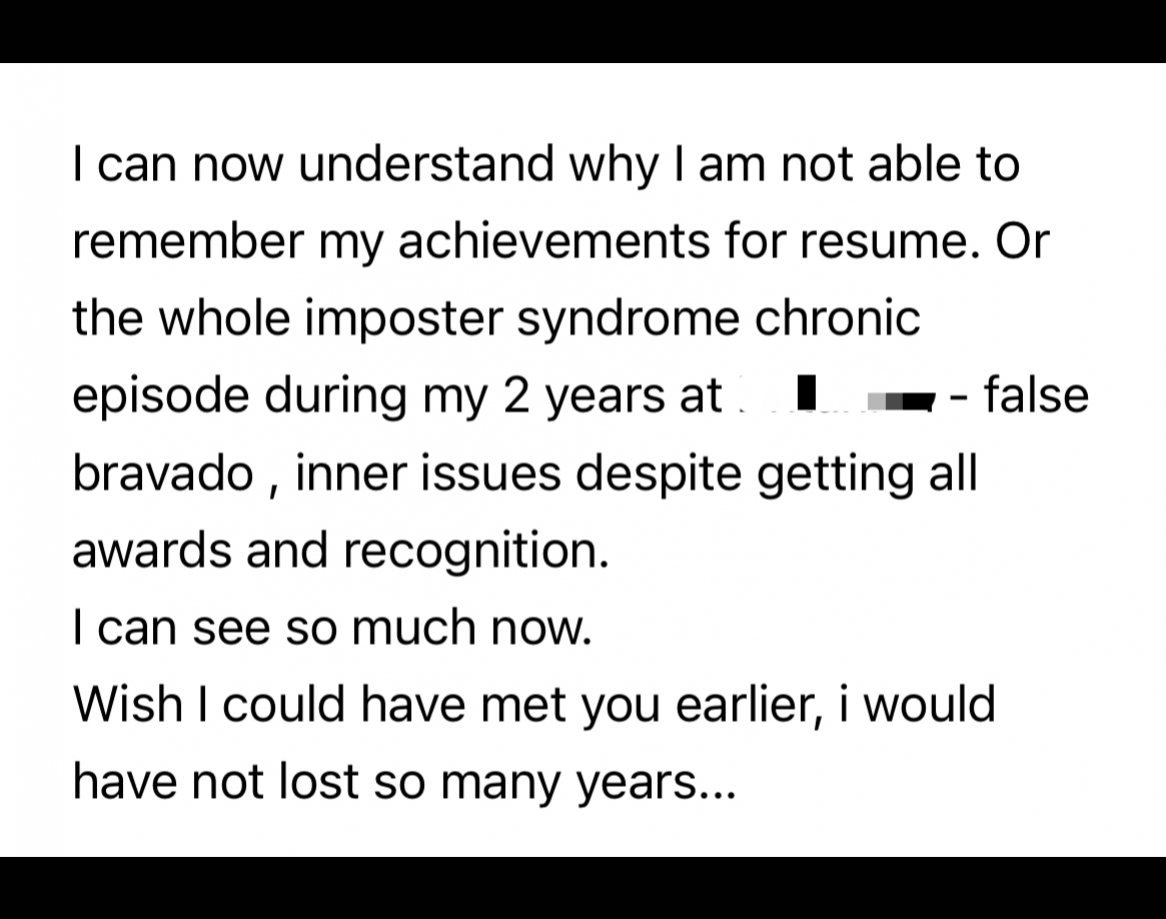
Client 2

Client 3

Client 4
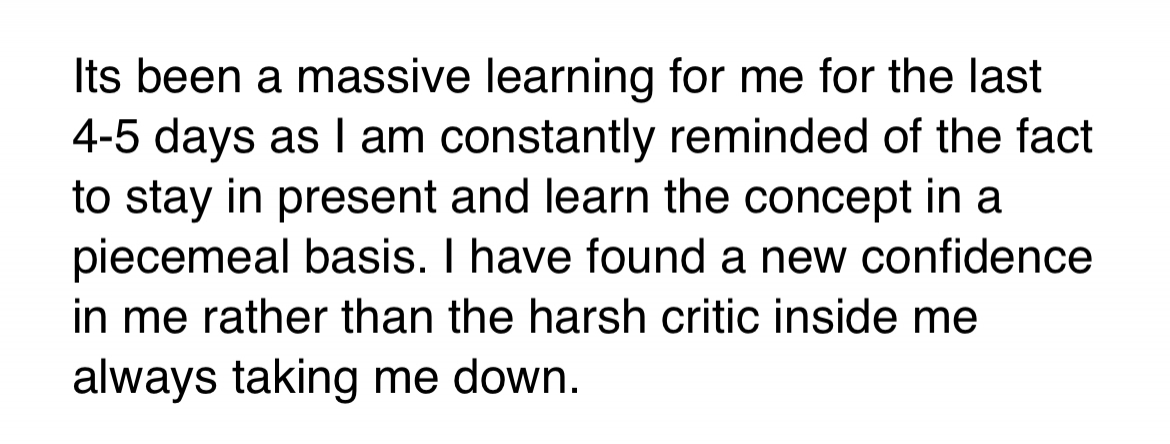
Client 5
Course Pricing
Tackling Impostor Syndrome (Course)
3333 INR
-
Deliver without doubt
-
- 2 hour pre-recorded masterclass on Tackling Impostor Syndrome
- 20 min training on how information overwhelm causes Impostor Syndrome
- Training on how Impostor Syndrome impacts us in salary negotiation
- Training on practices you can adopt to prevent Impostor Syndrome
- Training on how top performers develop Impostor Syndrome
Course Pricing
TACKLING IMPOSTOR SYNDROME
INR 3333 | USD 133
DELIVER WITHOUT DOUBT
2 hour pre-recorded masterclass
20 min bonus training on how information overwhelm causes Impostor Syndrome
Audio trainings on how Impostor Syndrome makes salary negotiation difficult
Audio training on how and why Impostor Syndrome affects top performers
Audio training on daily practices to prevent Impostor Syndrome

